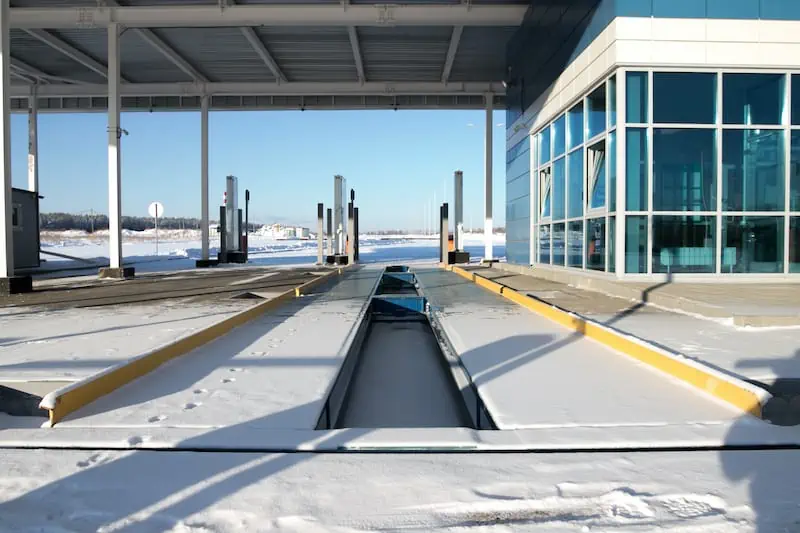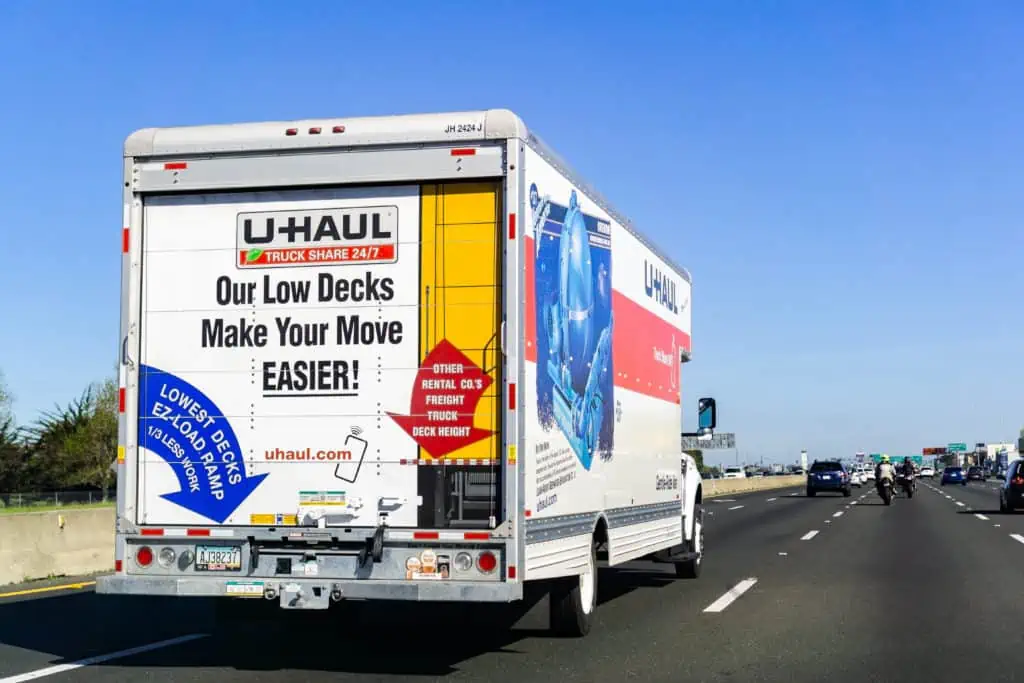If you’re planning on moving yourself across state lines with a rental truck, you may be wondering if have to get your U-Haul (or Budget or Penske) weighed when you drive past a weigh station. Weigh stations exist to make sure trucks aren’t too heavy for the road surfaces and bridges they are rolling over, and well, that is a case-by-case situation.
Here’s everything you need to know when you’re driving by a weight station.
Do I have to pull into a weigh station with a rental truck?
The answer is: it depends on how much your truck weighs and where you currently are (more below). This may feel like something complex or unusual, but it’s really not.
If you aren’t sure if you need to stop at that weigh station up ahead, go ahead and pull in. If your truck needs to be weighed, they’ll weigh it (for free). And if your truck doesn’t need to be weighed, they’ll just wave you on through. Piece of cake! It usually doesn’t take that long.
“…those weigh station folks know at a glance if a truck needs to stop. If you blow by a weigh station in a big enough truck…you can be chased down and fined, even if your truck is not overweight.”
And trust me, it’s more embarrassing to miss a weigh station than it is to get quickly waved through one.
How are you supposed to know how much your rental truck weighs?
Ideally, before you hit the road, there is one thing you’ll want to know: the Gross Vehicle Weight (GVW) of your truck.
The GVW equals the maximum allowable weight of the truck plus the weight of all your stuff in the back. The GVW should be written somewhere on the side of your truck.
Note that there also exists a Gross Vehicle Weight Rating (GVWR), which refers to the maximum weight a truck or trailer can safely carry. (In other words, it’s the GVW minus the weight of the truck.) While most weigh stations are concerned with your truck’s GVW, there are some that enforce their rules around a vehicle’s GVWR.
If this all sounds confusing, just pull in.
How much does my specific Uhaul/Penske/Budget truck weigh?
You’ll typically find the GVW written on the side of your truck, but here are the average numbers for trucks from some popular rental companies. (Your specific truck, depending on make, model, and year, might weigh a little less or a little more than the figure indicated, but it shouldn’t be more than the printed GVW in any way that really matters.)
U-Haul
Truck size (feet) – GVW (weight while empty/max. load allowable in lbs.)
- 10’ – 8600 lbs. (5,790/2,810)
- 15’ – 14,500 lbs. (8,115/6,385)
- 17’ – 14,500 lbs. (8,340/6,160)
- 20’ – 14,500 lbs. (8,800/5,700)
- 26’ – 25,999 lbs. (12,990/13,009)
Penske
Truck size (feet) – GVW (weight while empty/max. load allowable in lbs.)
- 12’ box – 9,900 lbs. (6,800/3,100)
- 16’ box – 12,500 lbs. (8,200/4,300)
- 22’ – 26,000 lbs. (14,000/11,999)
- 26’ – 26,000 lbs. (16,000/10,000)
Budget
Truck size (feet) – (weight while empty/max. load allowable in lbs.)
- 12’ – 10,050 lbs. (6,440/3,610)
- 16’ – 12,500 lbs. (8,040/4,460)
- 26’ – 26,000 lbs. (16,000/10,000)
(You can expect similar estimates for companies like Ryder, Enterprise, and others.)
What are the chances I really need to pull over?
There’s a moderate chance you’ll have to pull over, if only because some states require it.
Some states just make it easy and require any truck over 16,000 lbs. to stop. And several states require all trucks with as little as a GVW over 10,000 pounds to be weighed.
All that said, the smallest U-Haul and Penske trucks barely avoid crossing that specific threshold, even with a maxed-out load limit. Meanwhile, the smallest Budget is just a hair over this limit with a maxed-out load.
Realistically, for states that don’t flat-out enforce it, mandatory stopping in a weigh station doesn’t start coming into play until you get to at least a mid-sized truck with a decent-sized load. (But never just assume!)
Is my stuff really that dangerously heavy on the road?
Your belongings almost certainly won’t make your truck too heavy for the highway, but the truck itself can only safely handle so much stuff. (Trust me, your movers will understand this.) Still, unless you have more books than a library or more dumbbells than Gold’s Gym, you likely won’t have to worry about overloading your U-Haul.
You may, however, see signs showing weight limits for local roads and bridges, so it is a great idea to know at least approximately how much your truck and all your stuff weigh before disaster strikes.
(Protip: Speaking of disasters, keep in mind how tall your truck is too, for the bridges and overpasses you may encounter on those local roads. Personally, I like to put it on a Post-it note by the steering wheel.)
A truck’s size is a reliable indicator of its GVW, and those weigh station folks know at a glance if a truck needs to stop. If you blow by a weigh station in a big enough truck and someone notices, you can be chased down and fined, even if your truck is not overweight.
See prices for local moving labor. Read real customer reviews. Easily book your help online.
Which states force you to pull over and get weighed?
Some states don’t recognize rental moving trucks as commercial vehicles, and thus don’t have weighing requirements for U-Hauls. But again, some do.
Check the rules and laws below for the states you’ll be rolling through. (Scroll or swipe right.) Remember, there’s no need to sweat it! If you aren’t sure, just pull in!
| State | Rental required to stop? | Extra Info |
| Alabama | No | However: “Law Enforcement may require a truck be weighed.” |
| Alaska
dot.ask@alaska.gov |
No | “If the vehicle is not being used in commerce (furthering a business) then it does not need to stop at the weigh stations.” via Alaska DOT |
| Arizona | Yes | “Because some commercial companies use rental trucks, we ask that you stop at the weigh stations. They will ask what you are carrying and send you on your way,” via AZ DOT |
| Arkansas | Yes | “If the truck is one ton or larger it must pull through a station in Arkansas. 99% of the time it will be given a green light bypass and will not be required to stop,” via Arkansas Highway Patrol |
| California
https://dot.ca.gov/programs/traffic-operations/cvef/weigh-stations |
Yes | “A rental truck is a motor truck, according to CVC Section 410, and must stop at the weigh stations.” |
| Colorado
https://csp.colorado.gov/sections/units/port-of-entry/vehicles-required-to-clear-port-of-entry |
No | Only commercial vehicles (“motor vehicle used on a highway in interstate commerce to transport passengers or property”) over 16,000 lbs. empty weight or over a 26,000 lbs. GVW are required to stop. |
| Connecticut | No | N/A |
| Delaware | Yes | “(Only) if you have a hauling permit to travel through DE (are you) not required to stop at weigh stations.” |
| Florida | Yes | “All trucks traveling along state-maintained highways are expected to stop at every Weigh Station and Agricultural Inspection Station along the way to their destination.” |
| Georgia | Yes | “If the vehicle or combination is 10,001 lbs. GVWR or actual gross weight or over, you must pull into all open weight and inspection stations. Signs, lighted arrows, or enforcement personnel will guide you.” |
| Hawaii | Yes | “All vehicles over 10,000 lbs. are required to report to the weigh station when the station is opened and upon signal,” via Hawaii Motor Carrier Safety |
| Idaho | No | “If the U-Haul is operating commercially then the answer is yes. If (it’s for) personal use, weigh stations are not required,” via ITP |
| Illinois | Maybe | “All vehicles weighing 16,000 pounds or more gross weight must stop at any official weighing station,” via www.ilsos.gov |
| Indiana | Yes | N/A |
| Iowa | Yes* | All trucks over 10,000 lbs. GVW |
| Kansas | Yes | “Kansas law and the weigh station sign instruct all trucks to stop. They are several commercial entities that rent trucks to operate under the law. It is easiest to go through and be waved on than to be chased down and brought back,” via Kansas Transportation Division |
| Kentucky | Yes* | N/A |
| Louisiana | No | “(Not) if it’s a personal item move/personal rental.,” via Louisiana State Police |
| Maine | Yes | “Even if you are not in commerce, you still must stop at any open weigh station if your vehicle’s GVW or GVWR exceeds 10,000 pounds,” via Maine DOT |
| Maryland | Yes | “Maryland does require U-Haul trucks (and other rental trucks) to stop at weigh stations when they are open. All Maryland signs at weigh stations simply read, ‘All Vehicles Over 5 Tons Must Stop.’ No type of vehicle specified as long as the Gross Vehicle Weight Rating (GVWR), Actual Weight, or Combination Weight exceeds 10,000 pounds, you must stop at the weigh stations in Maryland when they are open,” via MdDOT |
| Massachusetts | No | N/A |
| Michigan | Yes | “A driver or owner of a truck or truck tractor, a truck or truck tractor with other vehicles in combination, or any special mobile equipment who fails to stop at or bypasses any scales or weighing station is responsible for a civil infraction,” via MSP |
| Minnesota | Yes | ”If the rental truck is rated at 10,001 lbs. or greater” |
| Mississippi | No | N/A |
| Missouri | Maybe | “All commercial vehicles, except those licensed for 18,000 pounds or less, are required to stop at an official weigh station. Others may be required to stop if directed by a peace officer or commercial vehicle officer/inspector,” via Missouri Dept. of Transportation |
| Montana | Yes | All trucks must stop at weigh stations |
| Nebraska | Yes* | Trucks over 10,000 lbs. GVW must stop |
| Nevada | No | “The state of Nevada does not have ports of entry or official weigh stations.” |
| New Hampshire | No | Trucks “…not being used in commerce = Do not stop,” via NH State Police |
| New Jersey | Yes | “If your rental vehicle has a weight of 10,001 lbs. or more in New Jersey, then it must stop at a weigh station,” via NJDOT |
| New Mexico | No | Only vehicles engaged in commerce are required to stop |
| New York | No | “(Trucks) not hauling commercial goods (do not need to stop),” via traffictickets.com/newyork |
| North Carolina | Yes | “Any person operating a vehicle or combination of vehicles having a GVWR of 10,0001 pounds or more…must enter a permanent weigh station or temporary inspection or weigh site as directed by duly erected signs or an electronic transponder for the purpose of being electronically screened for compliance, or weighed, or inspected,” via NCDPS/§ 20-118 |
| North Dakota | Yes | “All vehicles over 10,000 lbs. GVW,” via nd.gov |
| Ohio | No | Only commercial vehicles are required to stop |
| Oklahoma | Usually | “At Ports of Entry which are located inbound on I-35 from Kansas and Texas and on I-40 inbound from Arkansas and Texas, trucks are screened for weight, licensing and other requirements on the mainline and trucks must follow directions on the message boards. You may or may not be directed to pull in. At interior weigh stations trucks must stop when the weigh station is open. Those stations are on U.S. 271 north and southbound south of Hugo, U.S.69 southbound south of Durant, I-35 southbound near Davis, I-40 east and westbound at El Reno, I-35 northbound near Tonkawa and at Boise City in the panhandle,” via OCC TR Enforcement |
| Oregon | No | No stop is required “when a homeowner is moving personal property.” |
| Pennsylvania | Yes | All trucks must stop |
| Rhode Island | No | N/A |
| South Carolina | No, BUT | Department officials can order any truck that appears overweight to be weighed on the nearest scale |
| South Dakota | Yes | Any truck over 8,000 lbs. GVW |
| Tennessee | Yes | “Rental trucks are required to stop at weigh stations,” via Tenn. Dept. of Safety & Homeland Security |
| Texas | No | “Not unless they are involved in a commercial enterprise such as moving property for other people for hire,” via Texas Dept. of Public Safety |
| Utah | Yes* | N/A |
| Vermont | Yes | “They require all trucks to stop at the details. If they don’t need you to stop they will wave you on,” VIA Vermont DMV |
| Virginia | Yes | “Operators of trucks which have a registered gross weight in excess of 7,500 pounds are required by law to drive their vehicles onto scales for weight inspection as directed by either a police officer or regulatory highway signs,” via Virginia Code
https://law.lis.virginia.gov/admincode/title24/agency20/chapter81/section250/ |
| Washington | No | Only commercial vehicles are required to stop |
| West Virginia | No, BUT | You may be asked to pull over and be weighed by an enforcement officer |
| Wisconsin | Yes | Any truck over four tons must stop. Transportation rule 312.03(2) states, “…the Department chooses not to require operators of trucks having a gross weight of 8,000 pounds or less to stop at open weigh stations unless directed to do so by a traffic officer.” |
| Wyoming | No | “You aren’t required to stop if you’re driving a U-Haul (or other rental truck) with your own property,” via WyDOT |
Stay on the Safe Side
The info above represents the information we were given directly by various state officials or information we researched ourselves. It should be understood, however, that laws can change. And so does technology; many states are developing or have already implemented the use of portable scales, allowing state officials to weigh any vehicle anywhere.
They may weigh your truck. They may just wave you through. Either way, you’ll be on your way, with thoughts only of what lies ahead as you roll on toward your new home.
Just please, remember how tall your truck is!




